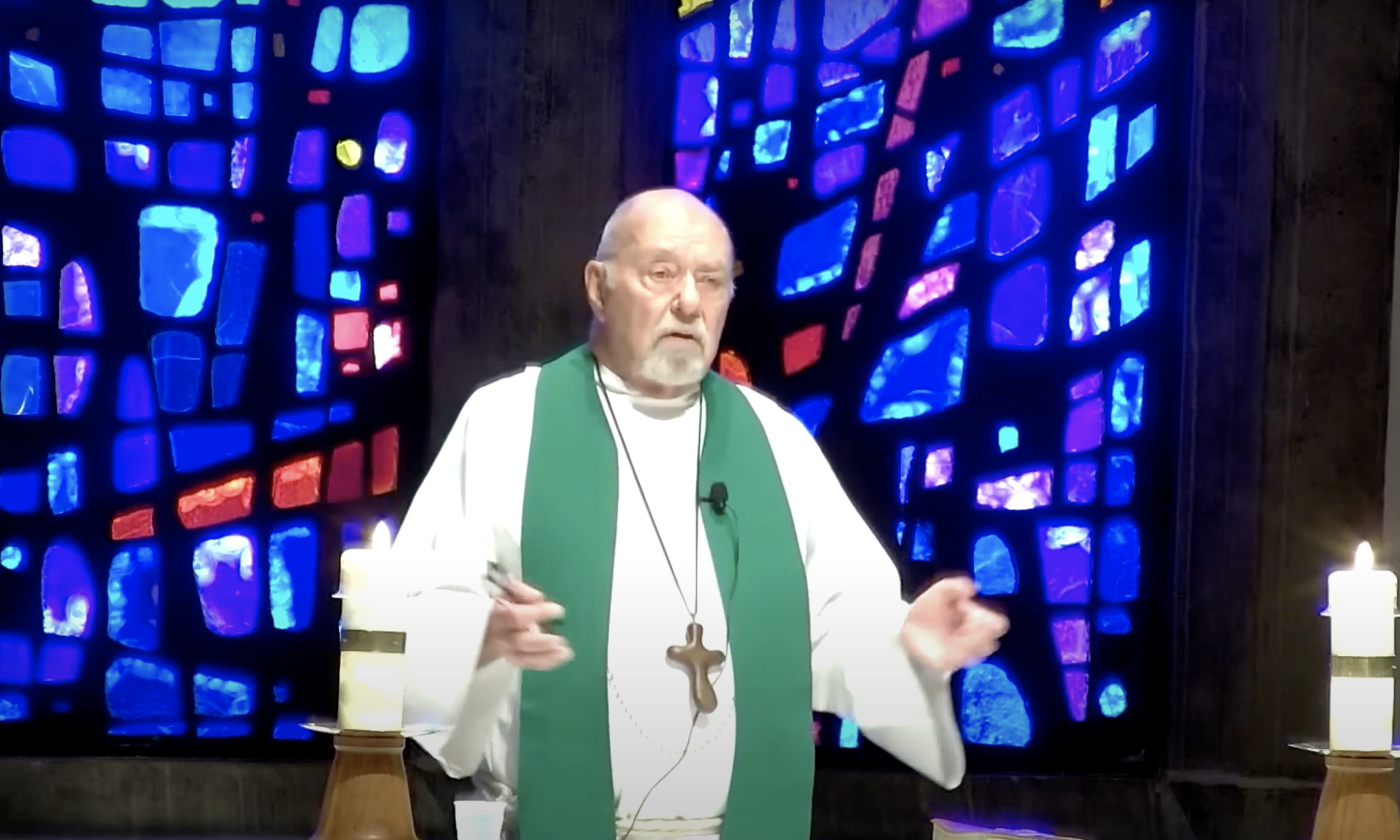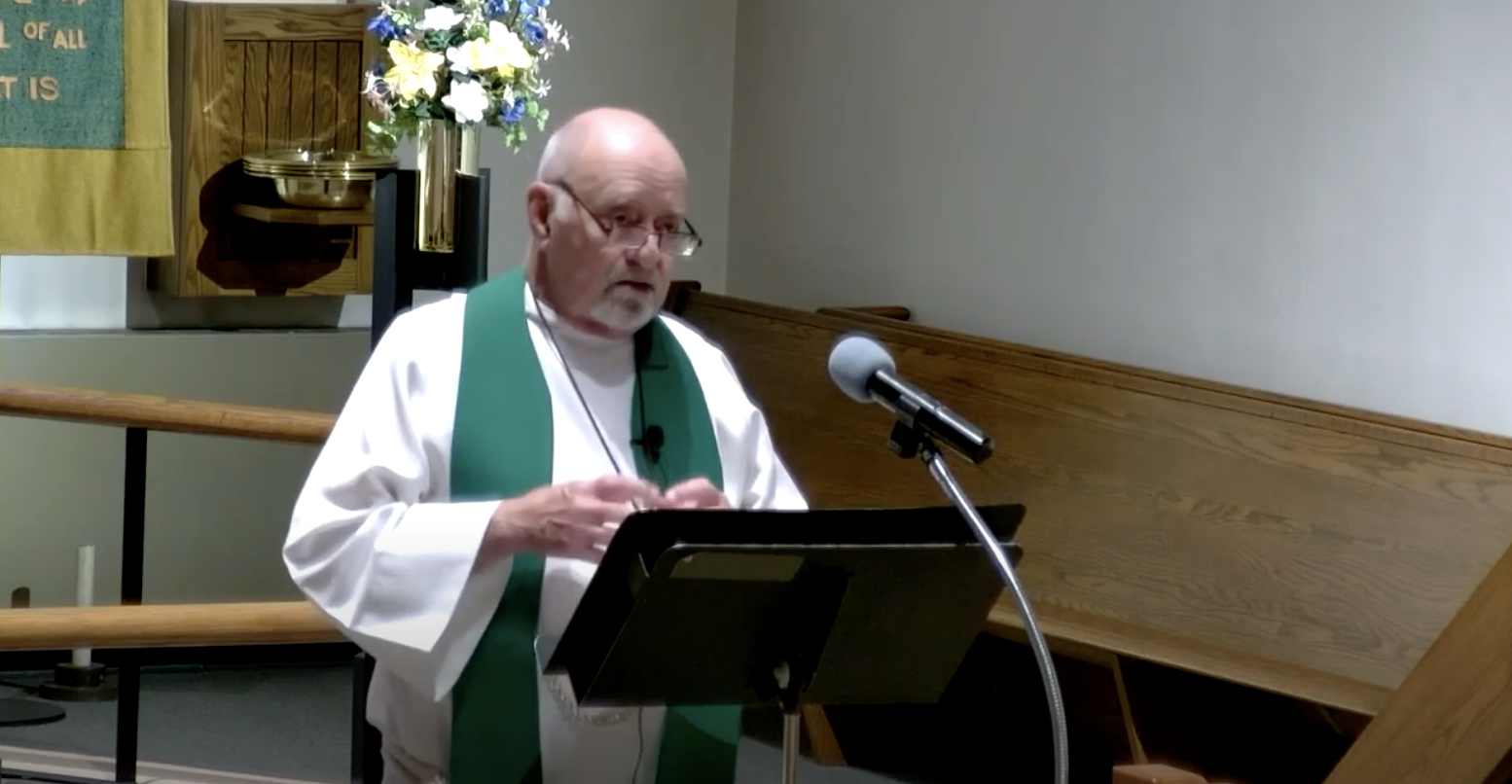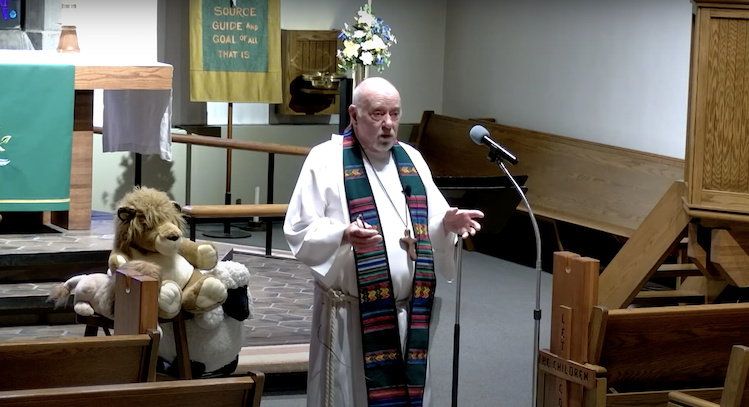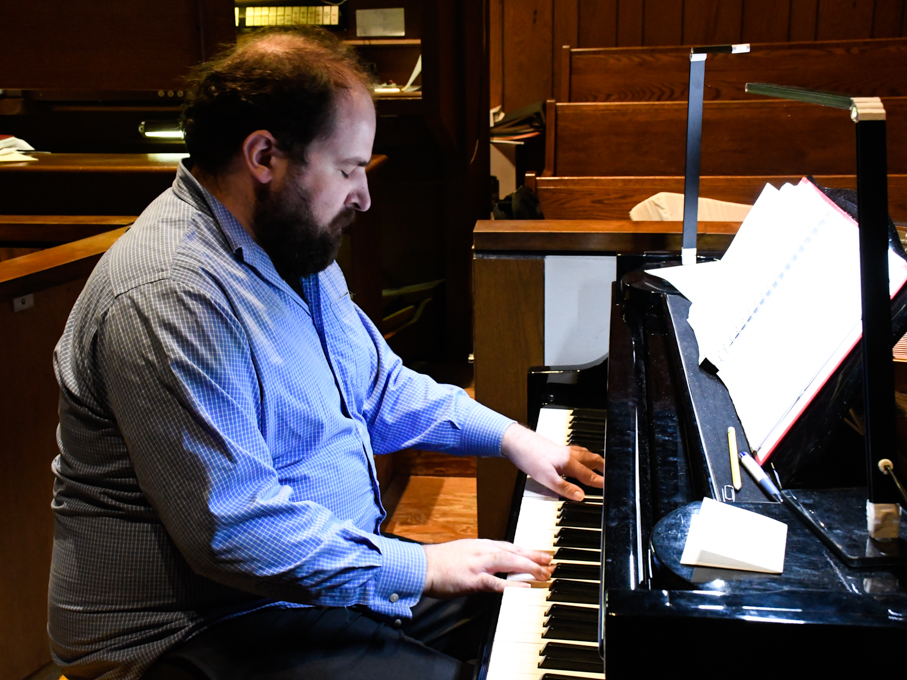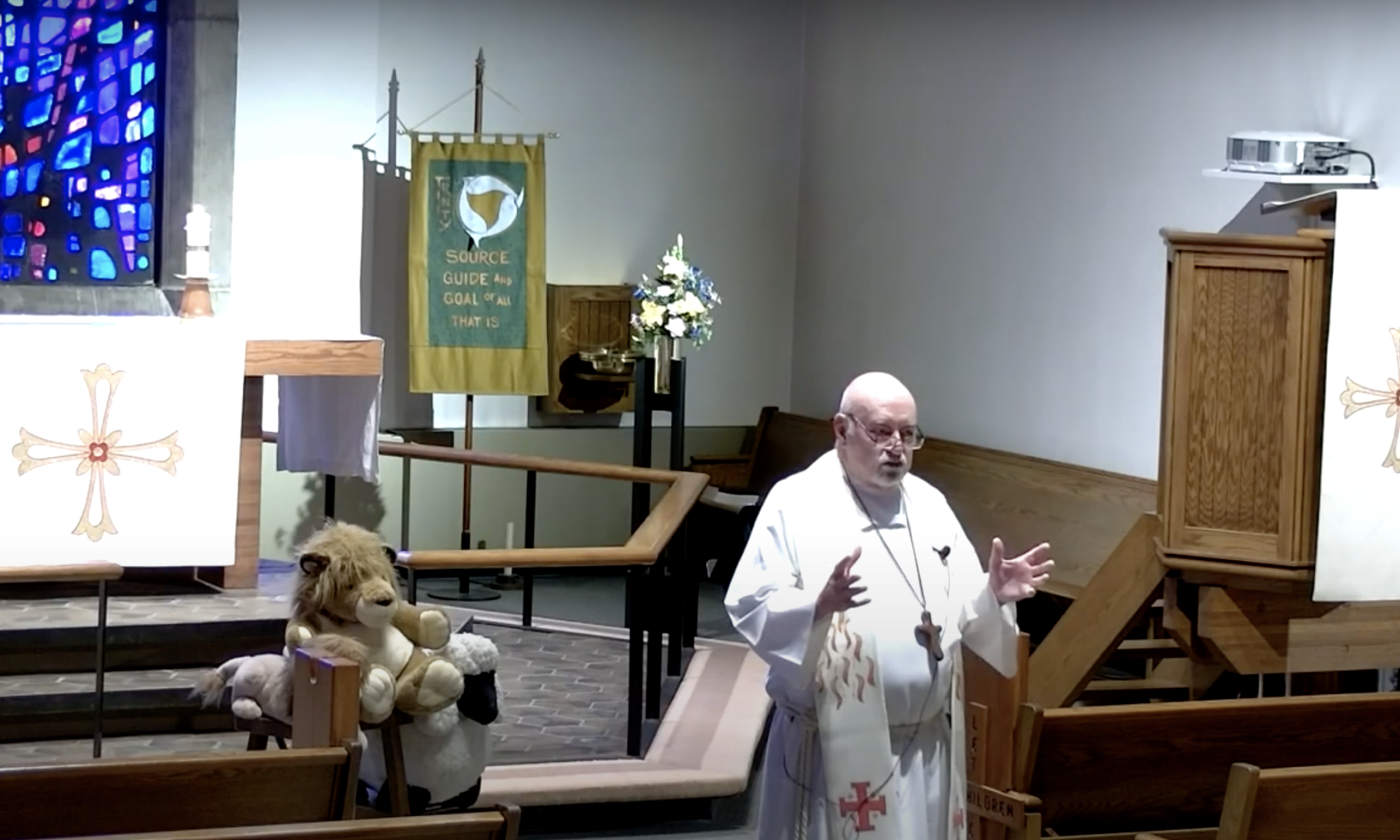Join us for our pre-recorded worship service and a message from Interim Pastor David Mueller: “It’s Simple!”
Our leaders today are Pastor Mueller, John Lasher, director of music and worship arts, and Cecelia Cronk, worship assistant. Also participating are this week’s Virtual Choir: Dave Herrmann, Allen Kirk, John Lasher, David McClure, John Nichols, Cheryl Powell and Teresa Stebner.
We’d like to hear from you, too! John Lasher has posted a questionnaire to get a sense of how and when you are viewing the pre-recorded services. Please take a few minutes to answer those questions and let him know.
Click on the link below to go directly to today’s pre-recorded service, which begins at 10 a.m. The text of the sermon is below if you wish to follow along.
“It’s Simple!” (Matthew 10:40-42)
Interim Pastor David E. Mueller
I am going to begin by making a thoroughly outrageous claim! Life can be and often is complex, but against that background, the message of Jesus is incredibly simple. In my message today, I will attempt to validate that claim.
Pray with me first.
Dear Lord God, Heavenly Father, You sent Your Son and our Savior Jesus Christ into the world because You love the world and all the people of it, no exceptions. Believing in Jesus Christ puts us in a wonderful position of being agents in loving the world and everyone in it. Empower and inspire us all this day with Your Holy Spirit to desire to live seeking justice and peace in our community, our country and our world. In Jesus’ Name. Amen.
I must insert here that last Sunday, I avoided preaching on the Gospel. In Matthew it fell immediately before what is being shared today. Jesus was portraying familial conflicts all over the place, claiming also that He came not to bring peace but a sword. That is scary, but I did not avoid it out of fear. At this time, when we are having to contend with a number of extremely difficult matters, I did not want to add to this reality.
I would share in passing that when Jesus uses the “sword” word, He is not talking about slaying anyone. By neither implication nor suggestion does the question “Who would Jesus kill?” have propriety. There is the “sword” of discernment between good and evil. Jesus desires to cut through the clutter and get to the truth of things, having cut away any falsehood. I could not help but offer this observation just in case in listening to last Sunday’s Gospel, anyone became upset. Please remember that Jesus came not to abolish but to fulfill the Law and the Prophets (Matthew 5:17). If the Law requires “honoring father and mother” Jesus would hardly rebut that. If anything, when we put Jesus first, our other relationships of all sorts are enriched.
In today’s short Gospel, Jesus presents a litany of simple truths about certain circumstances in which Christians might find themselves.
The first of the circumstances Jesus mentions is: “Whoever welcomes you welcomes me” — speaking to His disciples then and now. When we seek to represent Jesus to others, if we are accepted, so is Jesus. He then says: “whoever welcomes me welcomes the one who sent me.” If we, therefore, are accepted, so is God. God is in the midst of our attempts to represent God, simple as that!
Later in his “Olivet Discourse” (Matthew 25), Jesus with his words and not a sword separates the sheep and the goats saying whoever did or did not do certain things to “the “least of these” did it or did not do it to him. The association is profound. When I offer food to a hungry person, I am feeding Jesus. Jesus places himself in the position of the receiver and not the giver in these instances. In Proverbs 19:17, similarly we read: “He who is kind to the poor lends to the Lord.”
Years ago, decades actually, there was a homeless woman walking around Wilmington. Occasionally she showed up at Concordia when we were at Washington Street at Lea Blvd. On one occasion, it was the dead of winter, and she came asking for some help. I looked at her feet and, I kid you not, she had two clear plastic bags revealing soaked newspapers wrapped around her feet. No shoes! There was snow on the ground. Sears was right down the street. I drove her that short distance, led up to the shoe department, and asked the clerk to fit her with a new pair of good winter boots. After retching a bit, the sales clerk fitted her, gave her a thick pair of socks, and off the woman went to walk some more in winter at least with shoes on her feet. She thanked me and as she walked away, I said to myself, “I just bought Jesus a pair of shoes and socks!” It is as simple as that!
“Whoever welcomes a prophet in the name of a prophet will receive a prophet’s reward.” In Matthew 23:27, Jesus says “Jerusalem, Jerusalem, the city that kills the prophets and stones those who are sent to it.” If we are to judge prophetic effectiveness by how many hearers repented, the biblical prophets were miserable failures, with the exception of Jonah, who prophesied to the Gentiles of Nineveh, all of whom repented. We may not be living in a prophetic age, except for numerous false prophets, but if a true prophet spoke, we might just kill her or him, just like Jesus was killed. It is as simple as that! The welcome of a true prophet is rare indeed!
“Whoever welcomes a righteous person will receive the reward of the righteous.” I am not sure who is a righteous person, except that the biblical definition is “the righteous shall live by faith” (Galatians 3:11). We are looking for anyone who lives by faith in Jesus and enjoying time and talk with them. Simple!
“Whoever gives even a cup of cold water to one of these little ones in the name of a disciple….” This is simply beautiful. If, indeed, Jesus associates himself with those in need and we feed (clothe, visit, attend to) a child, we are especially attending to Jesus. I trust this does not surprise us. Jesus related with the children, the little ones. In Luke 18:17, Jesus said: “Truly I tell you, whoever does not receive the kingdom of God as a little child will never enter it.” The biblical language used to refer to believers is “children of God,” not adults of God.
We must distinguish between child-likeness and childishness. We are expected to grow up in the will of God, but if we grow as much as possible in this life, we are still closer to children than to elders. Some folk, baptized decades ago, are still splashing away in the wading pool and refusing to go out into the deeper waters of the faith. There comes a time in the faith to stop splashing and start swimming.
One often hears in Christian Church circles, “the children are the future of the church.” Nope! The children are already the church, no need to wait. We, like so many congregations of every denomination or expression, have cause to be deeply concerned about the noticeable absence of children and young adults in our midst. There are complex reasons for this which need to be understood, but the simple truth is that we have not been giving them enough water.
In John 19:34, we read: “… one of the soldiers pierced his side with a spear, and at once blood and water came out.” If we could take this book and wring it, it would drip blood and water. The blood symbolizes the violent nature of humanity and the violence extended toward Jesus. The water symbolizes the cleansing we know in Christ and the thirst quenching this basic substance can be to others, especially little others.
In faith, we need to be soaking wet and neither dry off nor dry up in the living faith we are privileged to know and share. It is this simple: water could not be more significant! We Christians are waterers!
